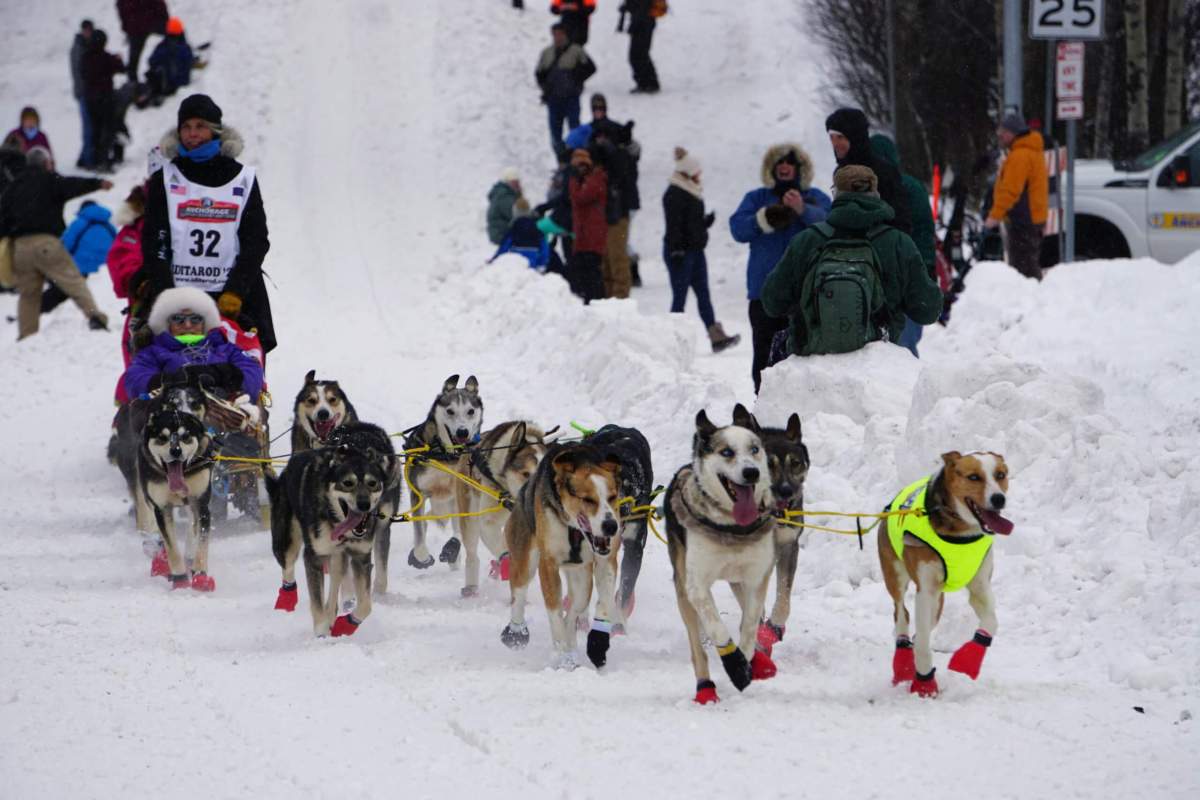Forty-nine mushers and their teams of huskies were due to depart Alaska’s largest city on Saturday for the 50th annual running of the Iditarod Trail Sled Dog Race, an event drastically altered by climate change and commercialism since its humble beginnings.
The starting gate has been returned to downtown Anchorage, a year after the COVID-19 pandemic prompted organizers to launch the 2021 race from a secluded riverside spot north of the city and off limits to the usual crowds of spectators.
But contestants will face unusually warm and sloppy conditions for the first day of the run, with recent bouts of rain and temperatures as high as the mid-40s eroding snow on the initial stretch of the trail.
Fortunately for the mushers and dog teams more accustomed to crisp, cold weather, the 11-mile Anchorage portion of the race is merely ceremonial, with timed competition starting on Sunday, giving contestants a chance to adjust to conditions.
Although the overall trail has been restored to its traditional 1,000-mile distance from Anchorage to the Bering Sea gold-rush town of Nome after a COVID-forced shortening of the course last year, a number of pandemic restrictions remain in effect.
Mushers, volunteers and fans who gathered for this year’s renewal of Iditarod festivities in Anchorage were instructed to mask up and take other precautions to prevent the spread of the still-lingering virus.
The pandemic also forced one last-minute switch. Nic Petit, a top musher, had to pull out of the race after testing positive for COVID-19. Four-time champion Jeff King, who had planned to sit out this year’s contest, then stepped in to drive Petit’s dog team to Nome.
Other returning winners are Dallas Seavey, who claimed a record-tying fifth victory last year, and his father, Mitch Seavey, a three-time champion who holds the Iditarod speed record of eight days, 3 hours and 40:13 minutes.
The field also includes Pete Kaiser, who in 2019 became the first Native Yup’ik musher to win the race, 2018 champion Joar Leifseth Ulsom of Norway, and four-time winner Martin Buser. Seventeen women are competing in this year’s Iditarod, one of the world’s few high-profile sports events in which women and men compete on an equal footing.
Humble beginnings
A half century after it was first run in 1973, the Iditarod has come a long way from its start as a low-budget, novelty event that drew a field of all-amateur mushers for a race that took the winner 20 days to complete.
Nowadays, top Iditarod contestants are professionals with high-tech gear bearing sponsors’ logos. Teams are tracked by global positioning satellite, and live coverage is beamed worldwide to audiences through internet streaming services. Winners typically reach the finish line in just nine days.
The modern race also attracts major corporate backing, though some companies have been pressured in recent years to drop their support by animal rights activists who condemn the marathon as cruel to the dogs.
Climate change has wrought some of the greatest changes in the world’s most famous sled-dog race, as it has for much of life in the far north.
Three times, most recently in 2017, unseasonably warm conditions forced the Iditarod to move its day-two restart – following the ceremonial Anchorage launch – much farther north, to Fairbanks.
In 2020, flooding swamped the ultra-thin Bering Sea ice that teams had to skirt near the end of the race. Three racers and their dogs had to be rescued from the coastal site only 25 miles (40 km) from the Nome finish line. Contestants who followed had to be rerouted farther inland to avoid standing water.
The course, though running at full length again this year, has still been altered somewhat, with checkpoints relocated to minimize contact with Native Alaska villages that remain vigilant against renewed coronavirus outbreaks because of scarce healthcare resources.
Organizers say such precautions are fitting for an annual race that honors a famed dog-sled relay run nearly a century ago to deliver diphtheria serum to Nome in 1925.




































